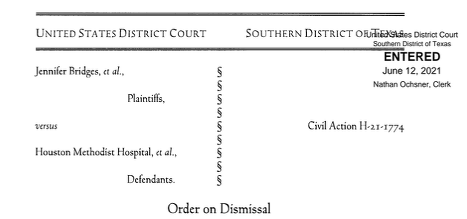- Free Consultation: (631) 352-0050 Tap Here to Call Us
Court Rules on First Apparent Challenge to Workplace Vaccination Requirement

Long Island employment lawyers Famighetti & Weinick PLLC have been blogging about whether employers can lawfully require employees to be vaccinated against COVID-19. Our blogs have concentrated on guidance issued by the federal Equal Employment Opportunity Commission and have opined that workplace vaccination requirements are likely lawful, at least under federal law.
But, the EEOC’s guidance is not binding and there have not been any apparent court cases concerning the legality of vaccination requirements. On June 12, 2021, however, a Texas federal court dismissed a challenge to a Texas hospital’s workplace rules requiring that employees be vaccinated or be fired. 116 employees challenged the rule. Today’s Long Island employment law blog discusses the case.
On April 1, 2021, Texas hospital Houston Methodist, issued a policy directing that all of its employees must be vaccinated by June 7, 2021. 116 employees challenged the rule in federal court and asked that the court block the hospital from requiring that they be injected with the vaccine or be fired.
Judge Lynn Hughes, a Ronald Reagan appointee, needed only five pages to justify dismissal of the case, a relatively short judicial decision, particularly considering the issues involved. The employees primarily challenged the vaccination under Texas laws concerning wrongful termination. The employees argued that the vaccinations are experimental and dangerous, so, if the employees were fired for refusing to subject themselves to an experimental and dangerous vaccine, it would constitute a wrongful termination.
Judge Hughes disagreed. The court explained that in Texas, a wrongful termination occurs only if an employee is fired for refusing to perform a criminal act. The court determined that taking a vaccine would not subject the employee to a criminal penalty, so refusing to take the vaccination could not give rise to a wrongful termination under Texas law.
The employees further argued that the vaccination requirement violates public policy making terminations for refusing to be vaccinated unlawful under Texas law. Preliminary, the court rejected the argument because public policy concerns do not alter Texas’s at-will employment rules. But moreover, the Supreme Court has held that forced vaccinations and forced quarantines are not against public policy and the federal EEOC has suggested that required workplace vaccinations do not violate federal EEO rules.
Finally, the employees argued that, generally, the vaccination policy violated public policy because it violates federal laws. Again, the court easily dismissed the argument because the laws the employees cited as being violated, regulate only the federal government, not private employers, such as the hospital.
Additionally, the court rejected the employees’ argument that they were being forced to be “human subjects”. Rather, the court determined that the hospital had not asked to use the employees in a trial, but were being vaccinated to keep the workplace safe. Finally, the court found it “reprehensible” that the employees would compare themselves to the subjects of Nazi doctors, discussing how the Nazis mutilated and inflicted pain on humans, whereas the hospital here was trying to save lives.
In sum, this first apparent court decision concerning forced COVID-19 vaccination of employees has been decided in much the way we predicted. Though many of the legal arguments centered on Texas law, the court’s reasoning is readily applicable to challenges which may be brought under New York law.
The law concerning vaccinations and COVID-19 is still evolving. If you have questions about workplace vaccination rules, contact a Long Island employment lawyer at 631-352-0050. More information about vaccination laws is available on our blog. We will continue to update our blogs as more courts consider workplace vaccination rules. Subscribe to our Facebook page to make sure you receive the latest updates from our employment attorneys.
Court Rules on COVID-19 Vaccination Requirement









